SEED GRANTS
The CITRIS Core Seed Funding program supports nascent ideas in information technology led by University of California researchers, spurring the ingenuity of UC innovators to respond to emerging research topics and societal issues. Through interdisciplinary collaborations, seed funds foster growth across the CITRIS campuses and jumpstart society’s next tech solution. Seed funds are designed to support the groundwork, data collection and prototyping needed to pursue larger awards that address major unsolved challenges in the IT sector. Prior awardees have attracted significant funding from federal, state, private and philanthropic sources.
SAFETY GUARANTEES IN THE CONTEXT OF GENERATIVE ARTIFICIAL INTELLIGENCE MODELS
Principal Investigator/s: Ayush Pandey (lead PI, UC Merced), Gireeja Ranade (UC Berkeley)
Air traffic control is a safety-critical service — meaning a single malfunction or mistake may lead to severe property damage, serious injury or death. It is also a very complicated system, simultaneously incorporating voice communication between pilots and traffic controllers, radar and meteorological data, and information about flight plans and maintenance logs. Generative AI has the potential to enhance the efficiency of air traffic control by managing various manual tasks and automatically detecting anomalies. However, generative AI is susceptible to user-interface attacks and is also prone to “hallucinating,” or offering reasonable-sounding but incorrect responses. This project aims to explore whether techniques from control theory can be used to provide safety guarantees for generative AI systems. The research team will identify a publicly available large language model and curate a dataset from the existing Federal Aviation Administration (FAA) catalog to use as an experimental testbed.
ACTIVITY MONITORING TO IMPROVE CAREGIVER CONNECTION AND CARE FOR OLDER ADULTS LIVING ALONE WITH ALZHEIMER’S DISEASE
Principal Investigator/s: Alyssa Weakley (Lead PI, UC Davis Health), Shijia Pan (UC Merced), Hao-Chuan Wang (UC Davis Health)
Alzheimer’s disease is expected to affect 1 in 9 people over the age of 65 in the United States by 2050. Many patients with dementia currently live alone, and the number of people who take on remote caregiving responsibilities will steadily increase in coming years. Family members who provide care from a distance often must balance these duties with their roles as parents and employees, increasing their stress in a situation already rife with challenges. This project intends to create a cohesive digital platform to help long-distance caregivers monitor their loved ones’ everyday activities, such as eating, cleaning and taking medication, and to communicate with them about the data. The technology will use vibration sensors and machine learning to detect deviations from regular behavior and will provide an interactive data visualization and communication tool, with the ultimate goal of keeping family members with dementia safely in their homes and preventing expensive and burdensome crisis-driven care.
RESTORING SPEECH COMMUNICATION WITH A MULTIMODAL DECODER-SYNTHESIZER
Principal Investigator/s: Lee Miller (Lead PI, UC Davis), Daniel J. Cates (UC Davis Health), Ahmed Sabbir Arif (UC Merced)
More than 1 in 100 people worldwide have lost their ability to produce natural and comprehensible speech — a condition called dysarthria — due to cancer, stroke or another cause. Right now, there is no technology to truly restore speech, only a few inadequate workarounds. This project will develop an assistive device that combines recordings of a person’s facial expressions and muscle movements and uses neural networks to synthesize and produce fluent speech in their own voice. The user will be able to move their mouth silently, as if they were speaking, to activate the device and generate their voice. This decoder-synthesizer will help restore quality of life for the tens of millions of individuals with dysarthria, allowing them to more easily and effectively interact with their co-workers, friends and loved ones.
THE IMPACT OF SHARED VALUES AND POWER ON SUCCESSFUL MENTORING FOR UNDER-REPRESENTED MINORITIES IN STEM
Principal Investigator/s: Sarah McCullough (UC Davis), Erin Hestir (UC Merced), Anita Balaraman (UC Berkeley)
A chasm often lies between what is taught in the classroom and what students need to be successful. Mentorship provides a vehicle for raising greater expectations by students and gauging whether a student is prepared to be successful in post-graduate academic endeavors or in the world of work. Unfortunately, mentorship remains a hidden pedagogy in undergraduate and graduate education, and beyond. This project aims to study the characteristics of mentoring programs that benefit historically underrepresented minorities in STEM and increase their retention and continuation in STEM fields. The program will study the impact of a digital mentorship program, enabling mentees to gain professional development skills and garner career advice during COVID-19 given social distancing requirements and across geographic barriers. This work will be presented at the University of New Mexico Mentoring Institute conference in Oct. 2022.
PLATFORMS AND THE FUTURE OF WORK IN DIGITIZED AGRICULTURE
Principal Investigator/s: Martin Kenney (UC Davis), M. Anne Visser (UC Davis), John Zysman (UC Berkeley), Catherine Keske (UC Merced)
As intelligent tools and systems are adopted in agriculture, California agriculturalists and workers will need to adapt and adjust. Data sharing can be used to create value by increasing transparency, traceability, and productivity. These benefits are predicated upon platform adoption. The conundrum is that, as the intermediary, the platform owner acquires significant power. This research examines five forms of platform organization and their benefits and drawbacks for actors in the agri-food system, farmers in particular. The types discussed are 1) startups, 2) agro-food industry firms, 3) agricultural cooperatives, 4) specially formed consortia of agri-food system actors, and 5) internet companies such as Google. The project will analyze the business models for each, assess likelihood of adoption, and effect on farmers and their practices.
DATA-DRIVEN FALL PREVENTION AND INTERVENTION FOR OLDER ADULTS
Principal Investigator/s: JoAnn Seibles(UC Davis Health), Wan Du (UC Merced), Shijia Pan (UC Merced)
Preventing falls among older adults is an important issue for these individuals, as well as their families and caregivers. Although organizations have started offering fall-prevention programs, participation remains low. For example, over the last 10 years, participation in the Healthy Aging Association’s (HAA) Young-At-Heart (YAH) balance training in Stanislaus County, CA, has increased at a lower rate than the increase of its senior population. This project will design, implement, and test a system using Internet of Things (IoT) technology that can assess the fall risk of older adults by passively measuring a set of fall risk factors. The performance of the system will be validated in HAA YAH classes. The research findings are important for improving the well-being of older adults and reduce the social cost of fall treatments.
AUTOMATIC BUILDING FAULT DETECTION AND DIAGNOSTIC SYSTEM USING SMARTPHONES
Principal Investigator/s: Alberto Cerpa (UC Merced), Avideh Zakhor (UC Berkeley)
Researchers will build a smartphone app whereby commercial-of-the-shelf (COTS) sensors are added to a mobile phone that can be used by facilities’ crews to detect and diagnose problems.
Developing resilient materials and sensors for improved building performance
Principal Investigator: Lilian Davila, Jeanette Cobian-Iñiguez

Given the devastating breadth of wildfires across 12 states in 2020, and the increasing prevalence of fires in locations with historically lower danger, more people are being exposed to fires at the wildland-urban interface (WUI). Many people in these locations are unaware of the dangers of wildfires and unprepared to evacuate their homes. This project plans to develop a platform for public fire training through immersive virtual environments for greater accessibility and evacuation decision-making under time pressure. The platform will help determine which sensory metrics best predict performance for these types of decisions and accurately represent real-time cognition. This technology will help civilians evacuate their homes more efficiently and, ultimately, help save lives.
Electric tractors: Identifying paths to clean energy in farming operations
Principal Investigator: Nicola Lercari

Almost all agricultural vehicles in current use rely on fossil fuels, one of the main sources of air pollutants. Electrification is a long-term solution to this problem, but to date, electric tractors have cost more, required more infrastructure and worked fewer hours per charge than their diesel counterparts. This project will develop a tool to help farm managers determine when to deploy the electric and diesel tractors in their fleets. This decision tool relies on data collected from the farm, such as acreage, crop types, soil and weather patterns, to compute overall power requirements for the fleet. Optimization techniques will help characterize an ideal balance between technical performance, economic costs and air pollution. The resulting information can help stakeholders in agriculture develop electrification strategies and ultimately create more sustainable systems.
Virtual evacuation decision-making under fire threat for personal property and transportation decisions
Principal Investigator: Spencer Castro

Given the devastating breadth of wildfires across 12 states in 2020, and the increasing prevalence of fires in locations with historically lower danger, more people are being exposed to fires at the wildland-urban interface (WUI). Many people in these locations are unaware of the dangers of wildfires and unprepared to evacuate their homes. This project plans to develop a platform for public fire training through immersive virtual environments for greater accessibility and evacuation decision-making under time pressure. The platform will help determine which sensory metrics best predict performance for these types of decisions and accurately represent real-time cognition. This technology will help civilians evacuate their homes more efficiently and, ultimately, help save lives.
Digital Preservation in Historic Bodie
Principal Investigator: Nicola Lercari

Your content goes here. Edit or remove this text inline or in the module Content settings. You can also style every aspect of this content in the module Design settings and even apply custom CSS to this text in the module Advanced settings.
Terrestrial Remote Sensing for Monitoring Atmospheric Particulates
Principal Investigator: Shawn Newsam

Using digital cameras, this project monitors for particulates in the air. California’s Central Valley suffers from some of the worst air pollution in the nation and yet there are only a handful of monitoring sites that can provide real-time measurements of pollution levels. Digital cameras of static scenes focusing on fixed objects, like the Sierra Nevada Mountains, offer a cost-effective alternative to using specialized monitoring equipment. The key technical challenge involved in this project is developing processing techniques for estimating pollution levels, specifically particulate concentrations. The project is currently studying reduced visibility from static images as a result of higher concentrations of particulate pollution.
Collaborative Virtual Environments for Virtual Heritage
Principal Investigator: Marcelo Kallmann

To explore innovation in human-computer interfacing for virtual environments, this project focused on reconstructing environments from historical sites. This will eventually lead to the creation of networked virtual heritage sites connecting multiple UCs and other institutions. Its main objective was to create natural interfaces for collaborative virtual environments to facilitate computer interactions accessible for non-computer experts to program virtual environments. The researchers will also contribute to an ongoing effort to establish a center on Autonomous and Interactive Systems at UC Merced. Some notable accomplishments from the project include: developing software to run a visualization system at UC Merced, visualizing datasets from UC Davis through visualization software developed at UC Davis. Researchers have also developed a graphics framework to display a realistic visualization of the virtual heritage dataset of Villa di Livia. In the future, adjustments will need to be developed to connect with a 10-camera system being installed to track the user’s motions.
The Sensing Entity Tracking Initiative (SETI): A CITRIS Center for Smart Energy Infrastructure
Principal Investigator: Alberto Cerpa
Power consumption inside buildings is one of the most critical factors when analyzing energy usage. The brand-new UC Merced campus represents a once-in-a-lifetime opportunity to create a full-scale test-bed for advanced energy management in campus buildings and systems. The new research university has made environmental performance, energy efficiency, and sustainability a campus-wide theme. Goals of this research include developing and deploying a sensor network system for real-time accurate estimation of person transitions among different part of the buildings when using public hallways. Researchers plan to utilize a 30 node smart camera test bed to be deployed in the Science and Engineering building. Through this test bed, they will collect extensive data to create a data-driven model that allows analysis and simulations. The project will enhance existing approaches to building design and operation with the results of its new measurement technologies.
Managed Aquifer Recharge Network (MAR-NET): Adaptive Floodwater Capture to Mitigate the California Budget Deficit
Principal Investigator: Thomas Harmon

Groundwater is often over-looked by the average Californian, but is an important—albeit overused—local source of water throughout the state. We currently use groundwater to close the gap between water demands and supplies from surface water and inter-basin transfers. The objective of the project was to create a prototype for an end-to-end Managed Aquifer Recharge Network (MAR-net) to help ensure a sustainable water supply for California. This project will design and test a scalable system for maintaining a continuous account of our groundwater resources. The project operated a prototypical MAR-net system in the Fresno Wastewater Treatment Plant from 10/2010 through 12/2011. The system included three vertical soil monitoring stations with moisture, temperature and salinity sensors, along with input flow metering, pressure transducers to measure pond depth, and a weather station. Researchers are currently developing a model to describe the data.
Motion Interfaces for Physical Therapy
Principal Investigator: Marcelo Kallmann

Real time motion capture and interactive 3D computer-generated environments are emerging as an integrated and powerful approach revolutionizing many applications. The potential for clinical and therapeutic applications is just beginning to be appreciated and explored in various areas of medicine, including telemedicine, stroke rehabilitation, pain management, and cognitive behavioral therapy. There are three main objectives for this research project: evaluate latest sensor technologies for use on virtual therapy applications, design an interactive prototype application for prescribed and personalized therapy rehabilitation, and to evaluate novel solutions for tracking finger, hand, and facial skin deformations for rehabilitation of hand motor control and facial expressions after burn injuries. This research resulted in a working prototype system for modeling upper-body physical therapy exercise motions and for automated monitoring of patients following exercises demonstrated by an animated 3D character. A provisional patent application about the main techniques was developed and two poster papers were presented and published at the IEEE VR conference.
Aggressively Duty-Cycling Buildings: The Next Frontier in Energy Efficiency
Principal Investigator: Alberto Cerpa

Sustainable buildings represent a major paradigm shift from current practice. According to the U.S. Department of Energy, buildings accounted for near 40% of US primary energy consumption in 2006, 75% of which is electrical energy. At the same time, energy and performance ratings are becoming more actively pursued and new methods are being sought for performance certification based on operational measurements. This defines a need to combine state of the art sensor network technology with novel processing and control algorithms in order to determine the distribution of people inside buildings and actuate the HVAC system using this information. Researchers plan to use an existing wireless sensor test bed of micro-cameras deployed on the SE1 Building at UC Merced in order to measure real-time occupancy. Further, they plan to develop a system to take the real time occupancy data from the testbed and interface with the EMS system in order to actuate part of the building. They plan to run control experiments obtaining quantitative and qualitative data of energy savings and levels of thermal comfort for the users.
Towards Semantic Spatial Awareness: Robust Text Spotting for Assistive Technology Applications
Principal Investigator: Stefano Carpin
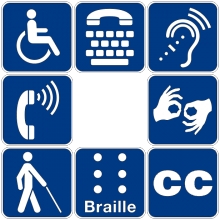
The ability to move independently is a critical component of a person’s quality of life. For many people, however, independent mobility is hampered by one or more forms of disability: motor, cognitive, or sensorial. For example, blind persons experience difficulty moving and finding their way in a previously unexplored environment, due to lack of visual access to the features that sighted persons use for self-orientation. Likewise, some wheelchair users may find it challenging or impossible to safely and reliably control their wheelchair due to poor upper limbs control or to cognitive impairment. The main goal of this project is the development of computer vision techniques that can be used to assist both categories of users mentioned above: persons who, due to visual impairment, experience difficulty self-orienting, and persons with mobility impairment who are unable to independently control the trajectory of their motorized wheelchair. Specifically, researchers will develop technology that promotes semantic spatial awareness in manmade environments by means of direct access to printed textual information.
Sensing CO2 Domes for Adaptive Management of Urban Greenhouse Gas Emissions
Principal Investigator: J. Elliott Campbell

Urbanized regions are responsible for a disproportionately large percentage (30-40%) of global anthropogenic greenhouse gas emissions. While a growing number of studies have addressed urban and suburban CO2 fluxes, current experimental techniques are not robust with respect to policy or scientific objectives. Thus, researchers explored a novel technique for surface flux partitioning based on coupled atmospheric models and continuous sensor-network observation of ambient CO2 and carbonyl sulfide. The goal of the project was to create proof of concept results and a science plan for developing, deploying, and assessing a new COS sensor and atmospheric modeling strategy for the application of greenhouse gas emissions measurement at the city scale. Researchers initiated the implementation of a unique top-down constraint on an urban GHG budget using the simultaneous analysis of atmospheric CO2 and carbonyl sulfide.
Archaeo-Pedia 3D: Collaborative Research in Cyber-Archaeology
Principal Investigator: Maurizio Forte

One of the key challenges in archaeology is successfully communicating data, even within the scientific community. Although there has been exponential growth in the production of 3D content for archaeology, very few are accessible. As a result, a very small percentage of information that is produced is well communicated. This has an adverse impact on the interpretation process, where the process remains an isolated experience without feedback. This project can create the necessary infrastructure to promote discussion and improve interpretations in real time. The primary goal of this project is to create a network of virtual collaborative environments across UC campuses to develop novel techniques for collaborative research and learning in archaeology. These environments allow users to interact and learn in rich 3D virtual spaces, where they can exchange data and information. Through these environments, history, archaeology and other scholars can collaboratively interpret reconstructed heritage artifacts, sites, and landscapes. This project will extensively integrate different immersive systems and 3D web virtual environments.
Virtual Reality Technologies for Robotic Aided First Response
Principal Investigator: Stefano Carpin

Every day, robotic technologies save human lives in a variety of situations. Robots can go where it is unsafe for human beings in first response situations, and they can be fully controlled by trained operators. Usually, the robot operator experiences the situation being assessed only through a user interface combining a set of perceptual cues provided by the robot sensors. Moreover, the operator interacts with the robot using control devices similar to those commonly used to control virtual reality artifacts, like video game characters or synthetic avatars operating in cyberspace. Thanks to a synergy between the robotics group at UC Merced and the Merced Sheriff Office SWAT team, the goal of this project is to explore how this interplay between virtual reality and robotics can lead to the development of better training tools for first responders. A unique feature of this project is the partnership between end-users already using tactical robots and a university research team with multi-year experience in the field of Urban Search and Rescue (USAR) robots.
Understanding Image-based Big Data using Human Computation
Principal Investigator: Ming-Hsuan Yang

This proposal seeks to enhance machine understanding of big image and video data sets by including human computational units as an element inside larger computational systems. Cameras generate by far the most data in the world, and even small organizations can easily deploy cameras to monitor social and environmental problems. Thus, this project has four goals: characterize and benchmark human computation co-processors (HPUS) platforms, propose instructions and algorithms, implement instructions and algorithms, and evaluate work. Researchers seek to build an automated test suite of small tasks that can be run on a wide set of HPU platforms, providing a snapshot of the accuracy, latency, and reliability of each platform. Researchers need to evaluate their work, which will be done using applications already under development that have previously suffered from insufficient robustness of existing computer vision libraries. Lastly, researchers will quantify performance against existing solutions.
ThermoVote: Participatory Sensing for Efficient Building HVAC Conditioning
Principal Investigator: Alberto Cerpa

In recent years, multiple works have been published showing how wireless sensor networks can be utilized to reduce the energy consumed by buildings. However, within the wireless sensor network community, there has been little research attempted to improve the quality of service for users. Instead, the aim has been simply to maintain, or in some cases, potentially decrease the quality of service in order to achieve greater efficiency. The goal of this research is to increase the conditioning effectiveness of the HVAC system by incorporating participatory sensing and making adjustments to the building management systems in real time. Part of this goal is to show how participatory sensing is an effective tool for augmenting and maintaining the building management systems.
The Solar Irradiance Mapping Initiative (SIMI): A CITRIS Center for Forecasting Solar Power Availability in California
Principal Investigator: Jean-Pierre Deplanque

Researchers at UC Merced designed and deployed 2 advanced solar observatories at the UC Merced and UC Davis campuses. In order to implement an effective policy for solar power connectivity, the ability to forecast both short- and long-term solar availability is paramount to utility companies and large-scale power generators. CITRIS researchers utilized SIMI, a new concept that combines state-of-the-art satellite and radar image processing with real-time data from ground solar stations to forecast solar power availability for the various atmospheric conditions found around California. The web-based, near real-time information database generated by SIMI is providing a direct estimate of both current and prospective power availability for solar-based technologies in the state of California, as well as facilitating the deployment and connectivity of solar power plants to the electric grid. The data will be used in decision-making regarding installation, incentives and policies for solar technologies through the consideration of geographical and financial constraints. One of the expected results from this initiative is a complete web-based GIS (Geographic Information System) that facilitates the promotion and management of solar energy utilization in California.
An EMR-based Probabilistic Clinical Support System for the Diagnosis and Treatment of Sepsis Patients
Principal Investigator: Shawn Newsam

Sepsis is a severe medical condition with high hospitalization cost and high mortality rates, with more than half of the patients with septic shock dying within 30 days. While scoring tests and alert systems are in place for sepsis patients, researchers currently lack a data-based tool to guide clinicians on early prognosis and effective treatment of sepsis. Researchers propose to create an adaptive, data-driven, probabilistic clinician decision support system (CDSS) that will employ state of the art machine learning tools to mine the data rich Electronic Medical Records of the UC Davis Health System and can be readily deployed throughout hospitals in CA and around the country. Specifically, the project will be organized in three main phases: data mining, system design and implementation, assessment and refinement.
Canary on a Chip: Biomimetic Lung-Based Biosensor for the Rapid Detection of Airborne Pollutants
Principal Investigator: Wei-Chun Chin
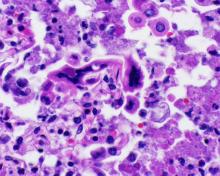
Respiratory epithelial cells, which form the lining of the airway system, provide our bodies its first line of defense against many harmful inhaled agents including dusts, air pollutants, chemicals and microbes, in addition to many biological and chemical agents. CITRIS researchers aimed to design and develop small-scale biosensors to incorporate airway epithelial cells to detect airborne pollutants through microfluidic devices. These devices detect harmful airborne agents, which, when integrated into a wireless system, would enable a detection system linked into a real-time communications network. These sensor communications networks could provide a much needed early warning system for sensitive areas, such as in large population centers or areas with polluted air. This project also represents a unique opportunity to apply sensor network technology to monitor the air quality in the San Joaquin Valley, which ranks amongst the most polluted air basins in the US and has been designated by EPA as a “nonattainment” area. However, biosensors for nanoparticles are still under-developed. This project aims to develop a highly sensitive and potential portable whole cell-based biosensor with the capability to detect the presence of a wide-variety of nanoparticles for air quality control.
Center for Sierra Nevada Water Information System
Principal Investigator: Roger Bales

The Center for Sierra Nevada Water Information System (CSNWIS) project resulted in a web portal which provides Sierra Nevada satellite-snow-cover information, wireless-sensor-network data, and analyses which are useful for water scientists, engineers, regulators, and managers. CSNWIS has created snow-covered-area datasets for 2000-2011 years which are currently available for viewing and download. Basin-scale analyses of snow products by elevation are also available through the web portal. Using a modular, scalable design, the CSNWIS provides a platform for archiving and serving water information. CSNWIS will continue to expand with more data sets to provide information to users with research and operational forecasting interests. In the future, projects may be expanded through collaboration with the California Resources Agency, hydroelectric companies, and local water providers.
Smart Transdermal Drug Delivery Patch
Principal Investigator: Ashlie Martini

Transdermal patches are the least invasive of available drug delivery techniques. Since their approval for clinical use in transdermal patches have become ideal carriers for a variety of drugs. Although transdermal patches are very promising, even wider application of this drug-delivery technique is still hindered by two main factors: the limited permeability of the human skin and the absence of a cheap, reliable and versatile patch that can release well-controlled dosages of a variety of drugs at precise time intervals over a long period. This project aims to design a smart controllable membrane, which combines the simplicity of a membrane based patch with the precise drug delivery of a complex micro-machine based system. This has the potential to decrease the cost and increase the applicability of transdermal delivery. The aim of the research is to investigate whether a modeling approach encompassing two complementary simulation techniques in an integrated framework can be used to design a smart membrane. Specifically, the goal of the proposed research is to investigate how porous membrane surface features could be rationally designed for precise flow control.
Efficient Strategies for Condition Monitoring and Fault Detection of HVAC Systems for Energy Efficient Buildings
Principal Investigator: Jian-Qiao Sun

Large and complex HVAC systems are naturally difficult to monitor. Indeed, one of the outcomes of this research was the development of a top-down strategy for fault detection, which discovered several faults in the Science and Engineering building. The objective of this project is to develop methods for effective monitoring of system conditions and fault detection of large and complex HVAC systems. This project contributes to the development of intelligent control, monitoring, and fault detection technologies that are integral part of energy-efficient carbon-neutral buildings. The key outcome of the project includes methods for spatial and temporal partition of large complex HVAC systems, development of pre-processing algorithms to discover new features in the monitored data set, selection of effective methods for HVAC monitoring and fault detection, and finally establishment of thresholds for various faults.
Economic Value of Improved Water Operations Enabled by Sensor-Based Information Technologies
Principal Investigator: Roger Bales

Intelligent water information systems have the potential to provide precise measurement of snowpack and its condition from day to day and particularly at critical points in the annual cycle. This information can be translated into more accurate flow predications, presenting managers with the opportunity to improve the operation of water infrastructure, including power generation, water supply, flood protection, and extend the functional life of existing infrastructure. The goal of this project is to collect and analyze data on the economic uses of water, understand the value of accuracy and timeliness of this information, and develop an improved economic model that can assess the value of better information concerning the release of water from watersheds above the river and reservoir system of California. Using sensor-based water management technologies, the researchers will select an initial case study for the work, and include recommendations on how the approach could be adapted.
Robotic and Virtual Assistive Agents for Establishing the Center on Autonomous and Interactive Systems at UC Merced
Principal Investigator: Stefano Carpin
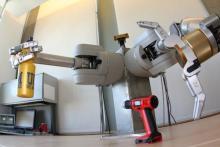
This research focuses on intelligent systems that can be used to train and assist people in preparation for or during complex and difficult situations. Two of its main sub-projects include wireless based localization and design of human-like motion interfaces. Intelligent systems must achieve the ability to seamlessly cooperate with humans in order to be successfully integrated into society. These systems can be fully autonomous, remotely operated, or directly controlled. When put in the context of a disaster framework where human-robot interfaces are key for achieving effective robot-operator and robot-victim interactions, the need for effective cooperation becomes especially apparent. There are two ways systems can be designed: carefully engineered to perform simple functionalities or programmed with generalized concepts to be reused under a variety of contexts.
Smart Cave Drones as Robotic Co-archaeologistics
Principal Investigator: YangQuan Chen
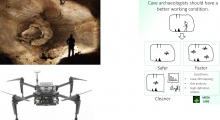
The goal of this CITRIS seed project is to advance technological development in mapping archaeological cave sites using low-cost drones for cave exploration as robotic ‘co-archaeologists.’ Using video imagery collected by drones, we plan to produce high resolution, accurate, 3D images with smart lighting control. This is a major advance in archaeological practice, enabling us to quickly map these complex spaces to that we may conduct 3D analyses. Our project will potentially forever change the way that future cave archaeology is done.
Integrating Electrically Conducting Membranes as In-Situ Sensors in Autonomous Water Treatment Systems
Principal Investigator: Mark Matsumoto

Growing populations, agricultural land under cultivation, and stricter environmental regulations are pushing providers to consider highly impaired water sources, such as wastewater, as potable water sources. However, the complex nature of these water resources in terms of the concentrations and variety of contaminants is driving a growing interest in membrane-based separation processes, due to the membrane’s ability to physically remove these contaminants from the purified product stream. Membrane systems are typically controlled using proprietary software and hardware, and require a skilled operator to monitor system performance. These conditions limit system flexibility, and make the deployment of these systems in remote locations difficult. In this project, we will develop membrane-based systems that couple electrically conducting membranes with open-source hardware and software to produce a modular and autonomous water treatment technology that can adjust operating conditions to respond to changes in feed water quality, as well as initiate cleaning and maintenance operations without the need of human intervention.
Enabling robots to express emotions based on human demonstrations
Principal Investigator: Marcelo Kallmann
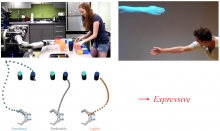
Robotics are becoming more and more involved in our lives, from working alongside us in factories, to empowering us to remain independent as we age. Despite working around us, robots tend to be purely functional entities. They go about their tasks methodically, only minding humans when they need to coordinate with us to achieve some task; little is known about how to make robots relatable to humans, a topic at the core of the People and Robots Initiative. The goal of this project is for robots to leverage ‘body language’ to express their state of awareness, hesitation, excitement, disappointment, etc. The project is a collaboration between roboticists, computer graphics experts and professional dancers. The team will develop and test methods for transferring motion capture data of a human dancer expressing emotions to a robot arm in a manner that preserves the emotional content of the motion. Experiments will use the PR2 and Kinova arm to evaluate these methods with human subjects via the Amazon Mechanical Turk platform.
Climate Feedback: Crowdsourcing the evaluation of climate change information credibility
Principal Investigator: Teenie Matlock

Climate Feedback (http://climatefeedback.org) brings the expertise of scientists to subject influential media articles about climate change to a process akin to peer-review. Using a new web-annotation tool, Hypothesis, scientists provide their analyses layered directly onto original text, validating science-based content, highlighting inaccuracies, or adding context. Each article evaluation features a summary in clear language for lay readers and a credibility rating issued by scientists. This rating provides an easy to share, objective and transparent assessment of the scientific credibility of a news source. Over the last 6 months, Climate Feedback’s network of contributors has grown to 70+ PhD scientists who have completed evaluations of a dozen articles from The Wall Street Journal, Mashable, CNN, The New York Times, Pope Francis’ Encyclical and more.
Mobile Remote Sensing Platform for Precision Agriculture
Principal Investigator: Stefano Carpin
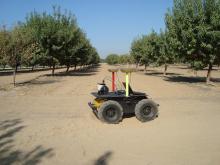
This project develops of a transformative measurement and analytical tool to empower crop managers with data to make critical decisions in the areas of water conservation and resources administration. The system consists of an autonomous robotic platform equipped with sensors to ground-validate and enhance data provided by currently available satellite systems. The robot autonomously navigates orchards collecting data ‘under the canopy’ that is otherwise not accessible from satellite or UAVs. Combining GPS, IMUs, and data coming from other sensors, the robot accurately localizes itself in the field and builds an accurate map of the orchard including a variety of information relevant to farmers, like presence of weeds, water leaks, and the like. The onboard control software also ensures navigation through predetermined waypoints is safe, i.e., it implements obstacle avoidance and other features handling unforeseen circumstances. By combining and validating satellite data with samples collected by an autonomous mobile sensor suite, a new class of decision support systems can be developed.
Genome-linked Antibiotic Resistance Database
Principal Investigator: Miriam Barlow

Antibiotic resistance is one of the most serious threats facing humanity. Unlike other problems such as clean energy, global climate change, and sustainable farming, we have no idea how to move forward to maintain the usefulness of antibiotics, and thus the ability to cure infections. In an effort to inform hospitals about the antibiotic resistance threats most likely to result in treatment failures, this project sequences the genomes of microbial isolates collected from Mercy Medical Center to determine what genetic components are making them resistant to antibiotics and creates a network available to hospitals for both accessing information about what resistance has been found in other hospitals and disseminating the information about resistance that an individual hospital collects. This effort is intended to prolong, over the short-term, the ability of doctors to identify the most effective antibiotic treatments, and over the long term, create a cooperative network that can examine and test different approaches to antibiotic resistance. Update: We have sequenced 24 genomes to obtain an initial data set, determine relatedness of bacteria, and assess the quality of sequencing. With this preliminary analysis now completed we are moving forward with more genomic sequencing, paying special attention to those resistance genes that we detected in the preliminary set.
